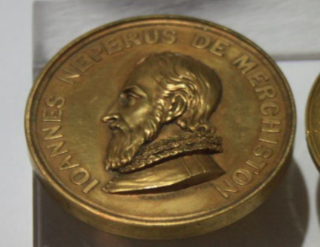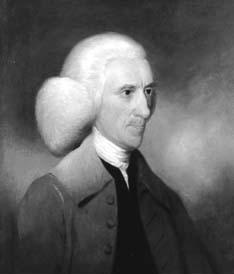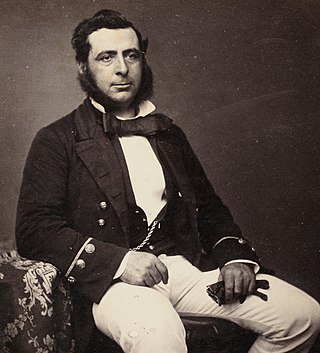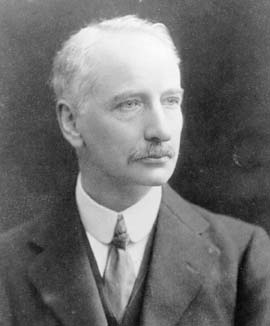Related Research Articles

Major General Sir Thomas Makdougall Brisbane, 1st Baronet,, was a British Army officer, administrator, and astronomer. Upon the recommendation of the Duke of Wellington, with whom he had served, he was appointed governor of New South Wales from 1821 to 1825.

The Royal Society of Edinburgh (RSE) is Scotland's national academy of science and letters. It is a registered charity that operates on a wholly independent and non-partisan basis and provides public benefit throughout Scotland. It was established in 1783. As of 2021, there are around 1,800 Fellows.

The Keith Medal was a prize awarded by the Royal Society of Edinburgh, Scotland's national academy, for a scientific paper published in the society's scientific journals, preference being given to a paper containing a discovery, either in mathematics or earth sciences.

Joseph Henry Maclagan Wedderburn FRSE FRS was a Scottish mathematician, who taught at Princeton University for most of his career. A significant algebraist, he proved that a finite division algebra is a field, and part of the Artin–Wedderburn theorem on simple algebras. He also worked on group theory and matrix algebra.

Alexander Wilson was a Scottish surgeon, type-founder, astronomer, mathematician and meteorologist. He was the first scientist to use kites in meteorological investigations.

George Chrystal FRSE FRS was a Scottish mathematician. He is primarily known for his books on algebra and his studies of seiches which earned him a Gold Medal from the Royal Society of London that was confirmed shortly after his death.
Hugh Robert Mill was a British geographer and meteorologist who was influential in the reform of geography teaching, and in the development of meteorology as a science. He was President of the Royal Meteorological Society for 1907/8, and President of the Geographical Association in 1932.

Inspector-General of Hospitals and Fleets Sir John Denis Macdonald was a naval surgeon.

John Gray McKendrick FRS FRSE FRCPE LLD was a distinguished Scottish physiologist. He was born and studied in Aberdeen, Scotland, and served as Regius Professor of Physiology at the University of Glasgow from 1876 to 1906. He was co-founder of the Physiological Society.
Frederick Valentine "Derick" Atkinson was a British mathematician, formerly of the University of Toronto, Canada, where he spent most of his career. Atkinson's theorem and Atkinson–Wilcox theorem are named after him. His PhD advisor at Oxford was Edward Charles Titchmarsh.
Ian Naismith Sneddon was a Scottish mathematician who worked on analysis and applied mathematics.
Sir Ernest MacLagan Wedderburn was a Scottish lawyer, and a significant figure both in the civic life of Edinburgh and in the legal establishment. He held the posts of Professor of Conveyancing in the University of Edinburgh (1922–35), Deputy Keeper of the Signet (1935–54), and Chairman of the General Council of Solicitors (1936–49), the forerunner to the Law Society of Scotland, and chaired the latter 1949/50. He was also an enthusiastic amateur scientist, and first Treasurer then Vice President of the Royal Society of Edinburgh.
Dr. John Dougall FRSE was "one of Scotland's leading mathematicians". Two formulas are named Dougall's formula after him: one for the sum of a 7F6 hypergeometric series, and another for the sum of a bilateral hypergeometric series.

Sharon Elizabeth Marie Ashbrook is a Professor of Physical Chemistry at the University of St Andrews. Her research is focused on the application of multinuclear solid-state NMR spectroscopy techniques as well as the combination of these techniques with first-principles calculations to investigate structure, order and dynamics of solid state materials.
William Thomas Gordon FRSE FGS FGSE FLS FGA (1884–1950) was a Scottish palaeontologist and palaeobotanist in the early 20th century. He was also an expert on diamonds and gemstones and assisted Hatton Garden in the testing of rare stones.
Arthur Thomas Masterman was an English zoologist and author. He was an expert on the British fishing industry.

William Peddie FRSE LLD was a Scottish physicist and applied mathematician, known for his research on colour vision and molecular magnetism.
Charles Robertson Marshall FRSE was an early 20th century British physician.

Prof John Edward Aloysius Steggall ARIBA FRSE LLD (1855–1935) was an English mathematician and professor at the University College, Dundee.

Malcolm Macdonald is a Scottish space technology engineer, academic, and director. He is a Professor and the Chair of Applied Space Technology at the University of Strathclyde, and a visiting professor at University College Dublin. He was Director of the Scottish Centre of Excellence in Satellite Applications, SoXSA, from 2014 - 2020, and a non-executive member of the UK Space Agency Steering Board from 2017 - 2020. He is an acknowledged expert in space research, and in 2021 was referred to in the media as "Scotland's leading space expert".
References
- ↑ Cleghorn (1870). "Obituary Notices of the late Dr William Seller and of Professor Bertoloni of Bologna" (PDF). Transactions of the Botanical Society of Edinburgh. 10: 202–205. doi:10.1080/03746607009468682.
- ↑ Laughton, L.G.C. (1912). . Dictionary of National Biography (2nd supplement). Vol. 2. pp. 517–518.
- ↑ "William Peddie". University of St Andrews. Retrieved 3 April 2017.
- ↑ "The Royal Society of Edinburgh: Makdougall Brisbane Prize". The Glasgow Herald . 3 July 1923. p. 9. Retrieved 5 June 2018.
- ↑ "The 11 medals of Arthur Holmes". The Geological Society. Retrieved 3 April 2017.
- ↑ Biographical Index of Former Fellows of the Royal Society of Edinburgh 1783–2002 (PDF). The Royal Society of Edinburgh. July 2006. ISBN 0 902 198 84 X. Archived from the original (PDF) on 24 January 2013. Retrieved 22 July 2016.
- ↑ Mingarelli, Angelo B. (2005). "A glimpse into the life and times of F.V. Atkinson". Math. Nachr. 278 (12–13): 1–29. arXiv: math/0608602 . Bibcode:2006math......8602M. doi:10.1002/mana.200410311.
- ↑ Alexander G Fitzgerald. "Walter Eric Spear" (PDF). Archived from the original (PDF) on 12 August 2016. Retrieved 22 July 2016.
- ↑ "William Fleming Hoggan Jarrett" (PDF). RSE. Retrieved 20 November 2017.
- 1 2 "Directory 2016/2017" (PDF). Royal Society of Edinburgh. Retrieved 3 April 2017.
- ↑ The International Who's Who 2004. p. 526.
- ↑ "2001 IEEE International Frequency Control Symposium & PDA Exhibit" (PDF). IEEE. Retrieved 2 May 2018.
- ↑ "Professor Mike Ferguson appointed to Wellcome Trust Board of Governors". Wellcome. Retrieved 3 April 2017.
- ↑ Lei Yang; Zhen Qiu; Greenaway, A. H.; Weiping Lu (2012). "A New Framework for Particle Detection in Low-SNR Fluorescence Live-Cell Images and Its Application for Improved Particle Tracking". IEEE Transactions on Biomedical Engineering. 59 (7): 2040–2050. doi:10.1109/TBME.2012.2196798. PMID 22552546.
- 1 2 3 4 "The Royal Society of Edinburgh – Makdougall Brisbane Prize". 28 October 2016.
- ↑ "Corday-Morgan Prize 2015 Winner". Royal Society of Chemistry. Retrieved 2 April 2017.
- ↑ "Rob Jenkins, Reader". University of York. Retrieved 3 April 2017.
- ↑ "Dr Aidan Robson". University of Glasgow. Retrieved 2 April 2017.
- ↑ "RSE announces Royal Medals and Prizes" (PDF). Royal Society of Edinburgh. Retrieved 2 April 2017.
- 1 2 "Early Career Prizes". Royal Society of Edinburgh. 28 October 2016. Retrieved 2 April 2017.
- ↑ "Academic Excellence Recognised with the Announcement of RSE Prizewinners". RSE. 7 April 2017. Retrieved 20 November 2017.
- ↑ "Distinguished Academics Recognised in RSE 2018 Medals and Prizes". RSE. Retrieved 13 May 2020.
- ↑ "Prestigious Medals for Pioneering Scientists and Researchers in Scotland". Royal Society of Edinburgh. Retrieved 14 May 2020.
- ↑ "RSE LADY MARGARET MOIR MEDAL". Royal Society of Edinburgh. Retrieved 26 March 2024.
- ↑ "2022 RSE MEDALS RECOGNISE PIONEERS IN SCIENCE, ACADEMIA AND PUBLIC ENGAGEMENT". Royal Society of Edinburgh. Retrieved 26 March 2024.